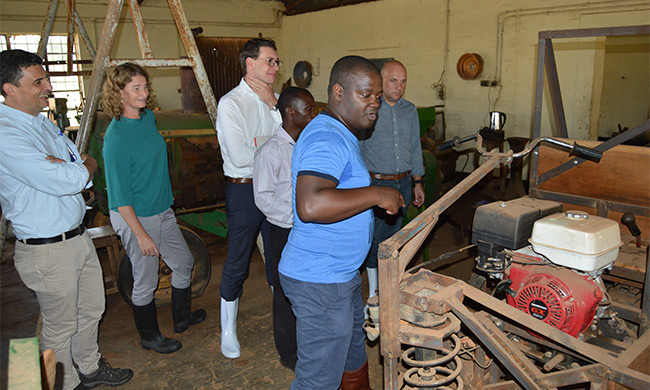“In Uganda, agriculture is for livelihoods, but we would like to focus on Agriculture for production and agribusiness. I am glad that young people are developing an interest in agriculture. The young people are willing to train and acquire relevant skills in modern Agriculture,” said the First Secretary and Deputy Head of Cooperation at the Embassy of Belgium in Uganda, Mr. Alexandre Brecx.
Mr. Alexandre Brecx who was accompanied by two guests from the Embassy made the remarks during a visit to Makerere University Agricultural Research Institute (MUARIK) on Monday 13th May 2019.
The historic visit aimed at strengthening the relationship between Makerere University and Belgium, understanding the operations of MUARIK and exploring possible opportunities for partnership in the field of agriculture as well as vocational skills training.
During the interaction with Staff from Makerere University’s Department of Agricultural and Biosystems Engineering, MUARIK and Mak Public Relations Office, Mr. Alexandre Brecx revealed that the Government of Belgium will focus on agriculture and vocational skills training as the next 5-year country programme.
“In the next country programme, we would like to focus on agriculture. Uganda has a huge potential for agriculture. We would like to partner with Makerere University to provide an important platform for students, youths and farmers to embrace the latest technologies in agricultural production,” he said.
Mr. Alexandre commended Makerere University for championing vocational skills training in Uganda. “I recognize Makerere University for its unmeasured effort to provide hands-on skill to the youth and farmers prioritizing agriculture. We acknowledge the important research undertaken by the Institution to solve farmers’ problems and the great innovations done from Makerere University geared towards improving Uganda’s agricultural sector,” he said.
The Belgium Government has immensely invested in building capacity of Makerere University staff especially in the area of Food and Agricultural Engineering and other related science subjects. According to Mr. Alexandre Brecx, every year the Government of Belgium sponsors students and staff from Makerere University to pursue their studies (graduate, postgraduate and research programmes) in Universities in Belgium.
On behalf of Makerere University, Prof. Noble Banadda, the Head, Department of Agricultural and Biosystems Engineering and an alumnus of Katholieke Universiteit Leuven, Belgium acknowledged support from the Government of Belgium that has enabled staff from Ugandan Institutions of Higher Learning to upgrade academically. He recognized the tremendous support the Government of Belgium is extending to Uganda through ENABEL to improve the agricultural sector of Uganda. He looked forward to a fruitful partnership between Makerere University and the Embassy of Belgium to Uganda that will lead to knowledge transfer in Agricultural Engineering and technological Incubation.
“We have the leading agricultural college in the region. It is also well known in capacity building and hands-on skills however, we need more knowledge and skills on mechanization, irrigation, equipment maintenance, agricultural and food processing equipment fabrication and welding. I am aware that Belgium mastered the art of these skills and we hope that when a partnership is sealed, we shall learn from them,” said Prof. Banadda.
Led by Mr. Tweyambe Chrysestom- the Farm Manager at MUARIK, the delegation visited the Engineering workshop where machinery and other agricultural tools are fabricated. They also visited the feed processing unit, the soil mixing and sterilization unit, the dairy chain, the banana plantation and the goats breeding unit. Throughout the tour, visitors interacted with students from Ssese Farmers Institute; who are undertaking their internship training at MUARIK.
Makerere University Agricultural Institute Kabanyolo (MUARIK) is an arm of Makerere University that interfaces with the National Agricultural research system (NARS). Seated on 650 hectares of land, the institute is being managed as a multi-disciplinary facility for training, research, outreach, and production under the College of Agriculture and Environmental Sciences.
The Institute is located 19 kilometers North-West of Kampala off Gayaza Township on the Kampala-Zirobwe Road. It houses;
- The Center for Continuing Agricultural Education Centre (CAEC),
- A Biotechnology Lab renowned globally for undertaking continental plant breeding programmes
- The Makerere University Regional Centre for Crop Improvement (MaRCCI) focused on an African continent free from hunger and malnutrition through the provision of improved varieties of food crops in Africa
- The Graduate Training and Research Laboratory, with state-of-the-art facilities aimed at enhancing the quality of analysis of practical field work for graduate students
- The Modern Poultry Unit (KOICA) comprising three (3) sub-units with a capacity of five thousand (5000) birds each, a brooder house, a drying shed for dehydrating chicken manure and a microbial facility to grow microorganisms to be used in the fermentation of chicken manure
- The Coffee Value Addition Centre (CURAD) focused on agri-business incubation to create employment opportunities for students.
- The Dairy Value Chain Unit and the Feed Mill
Article by Mak Public Relations Office


 General2 weeks ago
General2 weeks ago
 Natural Sciences2 weeks ago
Natural Sciences2 weeks ago
 Agriculture & Environment2 weeks ago
Agriculture & Environment2 weeks ago
 General7 days ago
General7 days ago
 Health2 weeks ago
Health2 weeks ago






